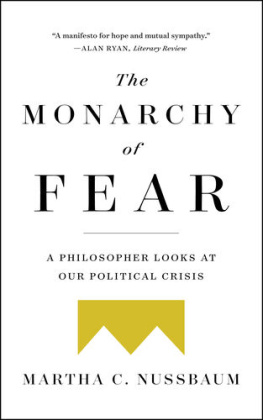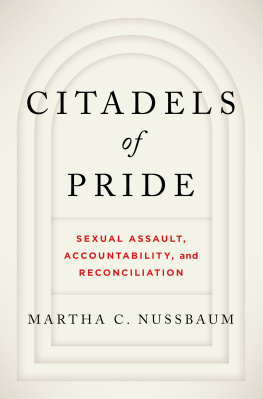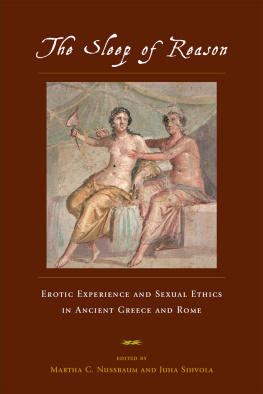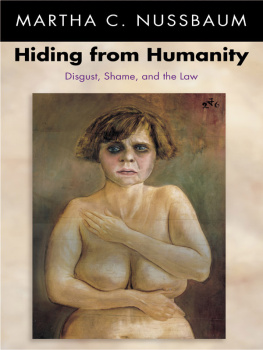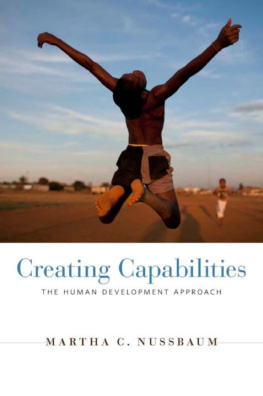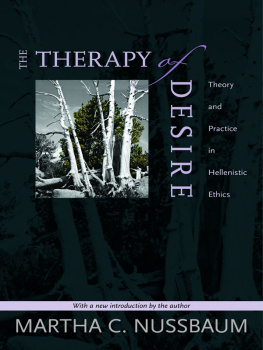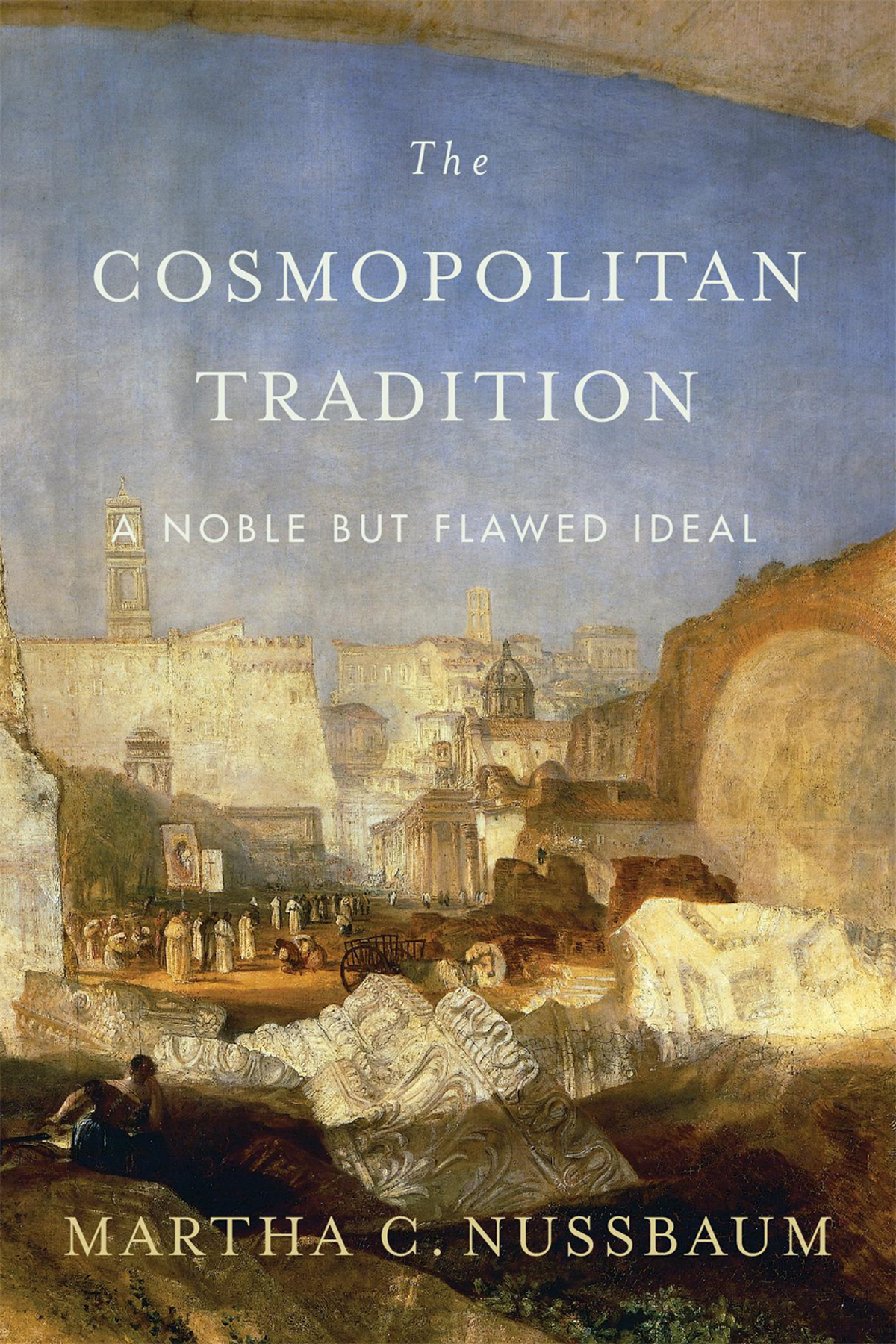MARTHA C. NUSSBAUM
Copyright 2019 by Martha C. Nussbaum
978-0-674-05249-9 (alk. paper)
Names: Nussbaum, Martha Craven, 1947 author.
Title: The cosmopolitan tradition : a noble but flawed ideal / Martha C. Nussbaum.
Description: Cambridge, Massachusetts : The Belknap Press of Harvard University Press, 2019. | Includes bibliographical references and index.
Subjects: LCSH: CosmopolitanismPhilosophy.
I. Citizens of the Kosmos
Asked where he came from, Diogenes the Cynic answered with a single word: kosmopolits, meaning, a citizen of the world (Diog. Laert. VI.63). This moment, however fictive, might be said to inaugurate a long tradition of cosmopolitan political thought in the Western tradition. A Greek male refuses the invitation to define himself by lineage, city, social class, even free birth, even gender. He insists on defining himself in terms of a characteristic that he shares with all other human beings, male and female, Greek and non-Greek, slave and free. And by calling himself not simply a dweller in the world but a citizen of the world, Diogenes suggests, as well, the possibility of a politics, or a moral approach to politics, that focuses on the humanity we share rather than the marks of local origin, status, class, and gender that divide us. It is a first step on the road that leads to Kants resonant idea of the kingdom of ends, a virtual polity of moral aspiration that unites all rational beings (although Diogenes, more inclusive, does not limit the community to the rational), and to Kants vision of a cosmopolitan politics that will join all humanity under laws given not by convention and class but by free moral choice. Diogenes, they say, used to make fun of good birth and distinctions of rank and all that sort of thing, calling them decorations of vice. The only correct political order was, he said, that in the world (kosmos) as a whole (VI.72).
Cynic / Stoic cosmopolitanism urges us to recognize the equal, and unconditional, worth of all human beings, a worth grounded in moral choice-capacity (or perhaps even this is too restrictive?), rather than on traits that depend on fortuitous natural or social arrangements. The insight that politics ought to treat human beings both as equal and as having a worth beyond price is one of the deepest and most influential insights of Western thought; it is responsible for much that is fine in the modern Western political imagination. One day, Alexander the Great came and stood over Diogenes, as he was sunning himself in the marketplace. Ask me for anything you want, Alexander said. He said, Get out of my light (VI.38). This image of the dignity of humanity, which can shine forth in its nakedness unless shadowed by the false claims of rank and kingship, a dignity that needs only the removal of that shadow to be vigorous and free, is one endpoint of a line that leads to the modern human rights movement.
In the tradition I shall describe, dignity is non-hierarchical. It belongsand in equal measureto all who have some basic threshold level of capacity for moral learning and choice. The tradition explicitly and pointedly excludes non-human animals, and I shall return to this problem in
Taken by itself, this vision need not involve politics: it is a moral ideal. In the thought of many of the traditions exemplars, however, the idea of equal human dignity does ground a distinctive set of obligations for international and national politics. The idea of respect for humanity has been at the root of much of the international human rights movement, and it has played a formative role in many national legal and constitutional traditions.
Nor is the idea of equal human dignity peculiar to the philosophical traditions of the West, although those traditions will be my focus in the present book. In an India riven by hierarchical ideas of caste and of occupations assigned at birth, Buddhism has long brought a different idea, the idea of human equality. Although Gandhi reinterpreted the Hindu tradition in a more egalitarian manner than was conventional, the Buddhist antecedents of the new nations founding principle of equal citizenship were dramatized by Gandhi, Nehru, and the other national founders by placing the Buddhist wheel of law at the center of the flag. The main architect of Indias constitution, B. R. Ambedkar, one of the great legal minds of the twentieth century, converted to Buddhism late in his life and remained entranced by it throughout his life. An untouchable (now dalit), he insisted on framing the constitution in ways that put the idea of equal human dignity front and center.
Similarly, the freedom movement in South Africa made respect for human dignity the center of a revolutionary politics. In this case, Stoic doctrines did play a rolealongside traditional African ideas of ubuntu. Philosopher Kwame Anthony Appiah has emphasized the formative role of Ciceros idea of world citizenship in the life and work of his father, Joe Appiah, founder of the modern nation of Ghana, When South Africas constitution was written, it contained these ideas. Whatever the role of Stoic ideas in the founding document, at least they dovetailed with ideas Mandela had already derived from his own traditions and his experience.
When the Universal Declaration of Human Rights was framed, its framers included representatives of many world traditions, including those of Egypt, China, and Europe. As French philosopher Jacques Maritain relates, they explicitly avoided language that was the sectarian property of a particular traditionfor example, the Christian language of the soul. The language of equal human dignity, however, as an ethical notion attached to no particular metaphysics, was something they felt they could use and make central.
The ideas of the cosmopolitan tradition have, then, been immensely fertile, and they have also intersected with related ideas from other traditions. But the founders of this Western tradition also introduce a problem with which the tradition has been wrestling ever since. For they think that, in order to treat people as having a dignity that lifes accidents cannot erode, they must scoff at money, rank, and power, saying that they are unnecessary for human flourishing. The dignity of moral capacity is complete in itself. Diogenes doesnt need to ask Alexander for a decent living, citizenship, health care: all he needs to say is, Get out of my light. Moral personality is complete, and completely beautiful, without any external aids. Cosmopolitan politics appears to the framers to impose stringent duties of respect, including an end to aggressive war, support for people who have been unjustly attacked, and a ban on crimes against humanity, including genocide and torture. But it imposes no duties of material aidon the grounds that human beings do not really need the goods of fortune. Without such aid, human dignity is still inviolate.


